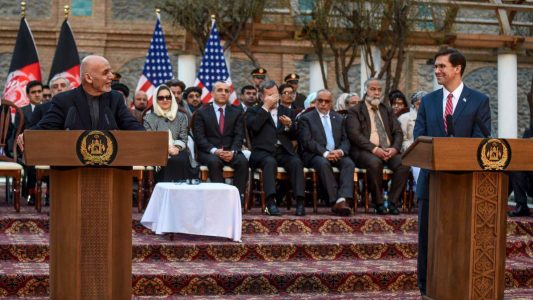
US peace deal with Taliban breaks down while the coronavirus spreads in Afghanistan
A “peace” deal concluded between Washington and the Taliban Islamist movement that was supposed to bring an end to US imperialism’s longest war is rapidly unraveling amid rising violence and the failure of the crisis-ridden Kabul regime to carry out a prisoner release agreement brokered by Washington.
The Taliban warned on Sunday that the agreement signed in the Qatari capital of Doha on February 29 is breaking down under the impact of what it charges are US violations in the form of airstrikes that have targeted its forces and killed civilians.
The latest reported airstrike took place early Sunday in the central Afghan province of Uruzgan, leaving at least eight civilians killed and two others gravely wounded according to regional officials. The Taliban blamed the US and its NATO-led “coalition” for the attack.
In another incident on Sunday, the Taliban charged that an airstrike carried out against a funeral in southern Zabul province killed two civilians. The Afghan Ministry of Defense claimed that its forces had attacked Taliban fighters there after a clash at a checkpoint manned by security forces of the Kabul regime.
Warning that its deal with the US was reaching the breaking point, the Taliban stated that the attacks had created “an atmosphere of mistrust that will not only damage the agreements, but also force the mujaheddin to a similar response and will increase the level of fighting.”
A spokesman for the US military dismissed the Taliban charges as “baseless,” while insisting that American occupation forces “will defend our ANDSF [Afghanistan National Defense and Security Forces] partners if attacked.”
Negotiations between the Taliban and the Kabul regime on a prisoner swap have also broken down, with the Islamist movement announcing that it was withdrawing its negotiating team from the Afghan capital after what it termed a series of “fruitless meetings.”
An agreement that Kabul would release 5,000 Taliban prisoners in return for the freeing of 1,000 soldiers, police and other pro-regime elements was part of the deal signed with the US in Doha. It was described as a “confidence-building measure” that was to precede “inter-Afghan” talks that had been scheduled for March 10.
The US-backed Kabul government headed by President Ashraf Ghani, however, said that it had not been party to this agreement. The Taliban refused to negotiate with it, regarding it as a US puppet, and Washington tacitly acknowledged this characterization by excluding it from the talks. The Kabul regime subsequently attempted to link the prisoner release to the imposition of new conditions upon the Taliban, including a halt to attacks on government security forces.
The Doha-based Taliban political spokesman Suhail Shaheen said that the technical team sent to Kabul would not continue participating in “fruitless meetings,” charging that the release of the movement’s prisoners had been repeatedly “delayed under one pretext or another.”
Spokesmen for Ghani’s government have claimed that the Taliban has demanded the release of 15 of its senior commanders held prisoner by the regime. Matin Bek, a member of the government’s negotiating team, told reporters on Monday that the government refused the demand. “We don’t want them to go back to the battlefield and capture a whole province.”
The regime is loath to release the prisoners without extracting concessions from the Taliban. It sees them as one of its few bargaining chips under conditions in which the Taliban has gained control over more territory than at any time since the October 2001 US invasion that overthrew the regime headed by the Islamist movement. Today, over half the country is either controlled or contested by the Taliban.
The Kabul regime’s negotiations with the Taliban have been hamstrung in part by its continuing failure to resolve its own internal crisis over a disputed presidential election held last September, whose results were announced only in late February, proclaiming incumbent Ghani the victor.
Source: World Socialist Web Site





